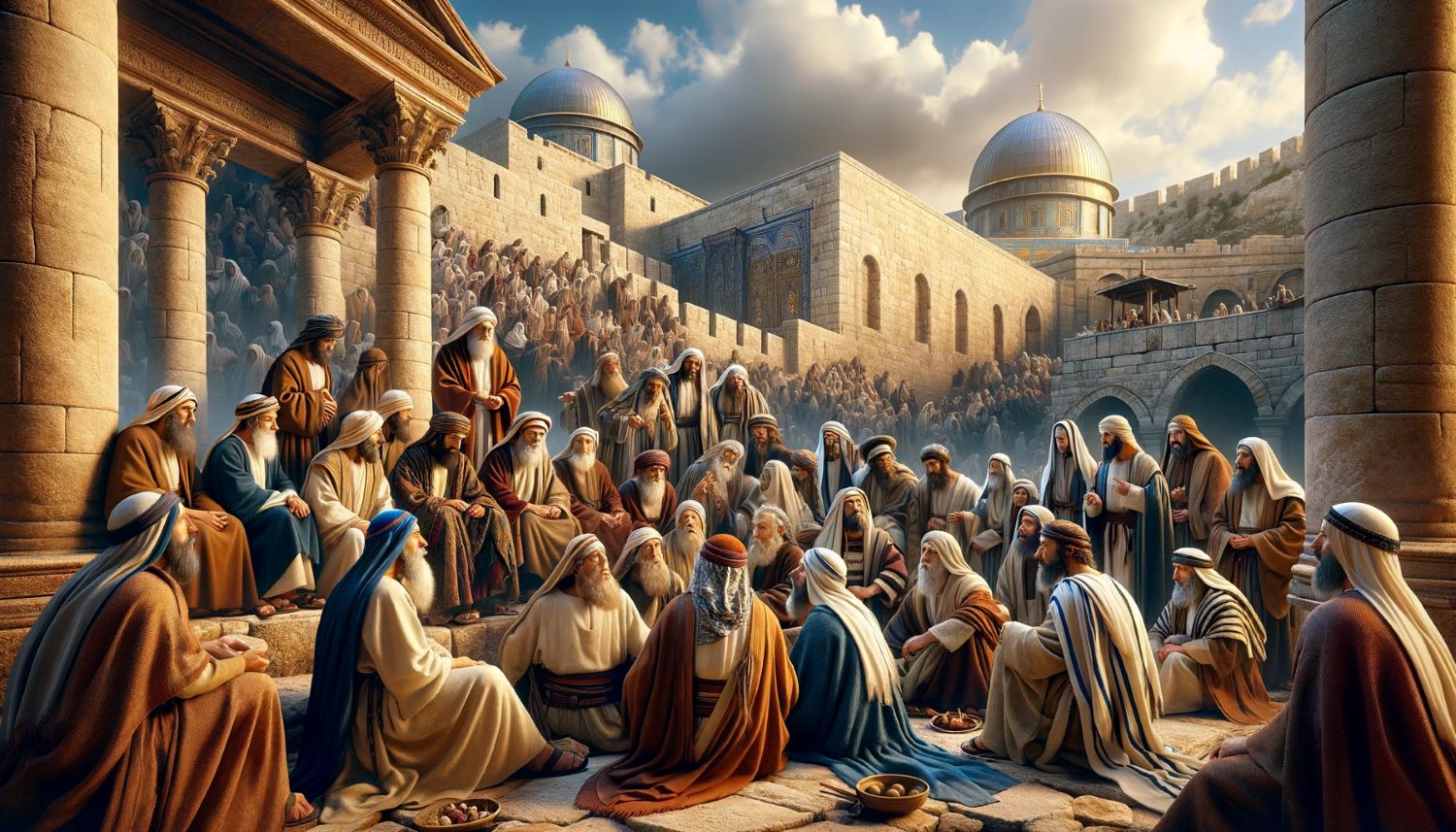Home>Bible Facts>How Many Miracles Did The Apostles Perform


Bible Facts
How Many Miracles Did The Apostles Perform
Published: February 22, 2024
Peter Smith, Editorial Director at Christian.net, combines deep insights into faith, politics, and culture to lead content creation that resonates widely. Awarded for his contributions to religious discourse, he previously headed a major organization for religious communicators, enhancing dialogue on faith's societal impacts.
Discover the fascinating Bible facts about the miracles performed by the apostles. Learn about the extraordinary acts that shaped early Christianity. Explore the impact of these miraculous events.
(Many of the links in this article redirect to a specific reviewed product. Your purchase of these products through affiliate links helps to generate commission for Christian.net, at no extra cost. Learn more)
Table of Contents
Introduction
The Bible is replete with accounts of miraculous events that have captivated believers for centuries. These extraordinary occurrences serve as powerful demonstrations of divine intervention and the unwavering faith of those involved. While the miracles performed by Jesus Christ are widely known and revered, the acts of the apostles also hold significant importance in the Christian faith.
The apostles, chosen by Jesus to spread his teachings and establish the early Christian church, were imbued with the power to perform miracles. These miraculous deeds served as a testament to the authority and legitimacy of their message, drawing multitudes to witness the transformative power of faith.
In this article, we will delve into the remarkable acts of the apostles as recorded in the New Testament, exploring the profound impact of their miracles on the burgeoning Christian community. By examining the nature and frequency of these extraordinary events, we aim to gain a deeper understanding of the pivotal role played by the apostles in shaping the early Christian movement.
Join us on this enlightening journey as we uncover the awe-inspiring accounts of the apostles' miracles and unravel the profound significance of these divine interventions in the annals of Christian history.
Read more: How Many James Were Apostles
The Miracles of Jesus
The New Testament of the Bible vividly portrays Jesus Christ as a miraculous figure, performing awe-inspiring deeds that transcended the natural order and left an indelible mark on those who bore witness to his divine power. The miracles of Jesus, often referred to as "signs" in the Gospel of John, served as compelling evidence of his identity as the Son of God and the long-awaited Messiah.
The accounts of Jesus' miracles encompass a wide array of extraordinary occurrences, each imbued with profound symbolism and spiritual significance. From turning water into wine at the wedding in Cana to walking on water amidst a tempestuous sea, Jesus' miraculous feats demonstrated his dominion over the elements and his ability to defy the constraints of the physical world.
Moreover, the healing miracles performed by Jesus stand as poignant testaments to his compassion and boundless mercy. Countless individuals afflicted with various ailments, including blindness, leprosy, and paralysis, found solace and restoration through the miraculous touch of Jesus. These miraculous healings not only alleviated physical suffering but also symbolized the spiritual restoration and liberation that Jesus offered to all who sought him.
The feeding of the five thousand, a miraculous multiplication of loaves and fishes to satisfy the hunger of a vast multitude, exemplifies Jesus' ability to provide abundantly for the needs of his followers. This extraordinary event underscored his role as the ultimate provider and sustainer, offering nourishment for both the body and the soul.
Furthermore, the resurrection of Lazarus stands as one of the most profound and stirring miracles attributed to Jesus. By calling forth Lazarus from the grips of death, Jesus showcased his authority over mortality and foreshadowed his own impending triumph over the grave, laying the groundwork for the hope of eternal life that he would later impart to humanity through his sacrificial death and resurrection.
In essence, the miracles of Jesus serve as compelling manifestations of his divine nature, affirming his identity as the Son of God and the embodiment of God's redemptive love for humanity. These extraordinary acts not only inspired awe and wonder but also instilled unwavering faith in the hearts of those who bore witness to the transformative power of Jesus' miracles.
The Miracles of the Apostles
The New Testament chronicles the remarkable acts of the apostles, who, following the ascension of Jesus, were endowed with the power to perform miracles through the Holy Spirit. These extraordinary deeds served as compelling demonstrations of divine authority and played a pivotal role in establishing the credibility of the apostles' message.
The miracles of the apostles encompassed a diverse range of extraordinary occurrences, echoing the profound nature of Jesus' own miraculous ministry. Among these remarkable feats, the healing of the lame beggar at the Beautiful Gate of the temple stands as a poignant testament to the apostles' divine empowerment. Through the name of Jesus Christ, the apostles bestowed strength and wholeness upon the beggar, eliciting astonishment and awe among the onlookers.
Furthermore, the apostles demonstrated their authority over life and death through the miraculous raising of individuals such as Tabitha and Eutychus, underscoring the transformative power of faith and the indomitable nature of God's redemptive grace. These extraordinary acts of restoration and revival not only brought solace to the grieving but also served as powerful affirmations of the apostles' divine commission to proclaim the message of salvation.
Additionally, the apostles exhibited the ability to perform extraordinary signs and wonders, such as the healing of the sick and the casting out of unclean spirits. These miraculous interventions not only alleviated physical afflictions but also bore witness to the spiritual liberation and transformative renewal brought forth by the apostles' ministry.
The apostle Peter, in particular, emerged as a prominent vessel of divine power, with his shadow being believed to impart healing to the infirm. This remarkable phenomenon attested to the pervasive impact of the apostles' miraculous deeds, drawing multitudes seeking solace and restoration to the sphere of their influence.
In essence, the miracles of the apostles served as compelling manifestations of the divine authority bestowed upon them, affirming their role as heralds of the Gospel and instrumental figures in the establishment of the early Christian church. These extraordinary acts not only inspired awe and reverence but also bore witness to the transformative power of faith and the indomitable nature of God's redemptive love manifested through the apostles' ministry.
The Number of Miracles Performed by the Apostles
The New Testament provides accounts of numerous miracles performed by the apostles, showcasing the extraordinary manifestations of divine power that accompanied their ministry. While an exact tally of these miraculous deeds is not explicitly delineated, the recorded instances offer profound insights into the prolific nature of the apostles' miraculous interventions.
The Book of Acts serves as a primary source of the apostolic miracles, depicting a series of extraordinary occurrences that underscore the transformative impact of the apostles' divine empowerment. From the healing of the lame beggar at the Beautiful Gate to the miraculous deliverance of individuals from afflictions and unclean spirits, the apostles' ministry was marked by a remarkable outpouring of miraculous manifestations.
The apostle Peter, renowned for his unwavering faith and fervent proclamation of the Gospel, emerged as a prominent vessel of divine power, with numerous miraculous interventions attributed to his ministry. The healing of the paralyzed man at the temple in Acts 3 and the restoration of Tabitha to life in Acts 9 stand as poignant testaments to the profound impact of Peter's miraculous deeds.
Similarly, the apostle Paul, through his fervent missionary endeavors, demonstrated an exceptional capacity to perform miracles that affirmed the authenticity of his apostolic calling. The healing of the crippled man at Lystra and the deliverance of the demon-possessed girl in Philippi exemplify the extraordinary nature of Paul's miraculous interventions, underscoring the pervasive influence of his ministry.
Moreover, the collective ministry of the apostles, characterized by fervent proclamation and unwavering faith, engendered a multitude of miraculous occurrences that bore witness to the transformative power of the Gospel. The Acts of the Apostles portrays a tapestry of miraculous interventions, ranging from healings and deliverances to extraordinary signs and wonders, each serving as a compelling testament to the divine authority bestowed upon the apostles.
While a precise enumeration of the apostles' miracles remains elusive, the cumulative impact of their extraordinary deeds reverberates throughout the annals of Christian history, inspiring awe and reverence for generations to come. The prolific nature of the apostles' miraculous interventions stands as a resounding testament to the transformative power of faith and the indomitable nature of God's redemptive love manifested through their ministry.
The Significance of the Apostles' Miracles
The miracles performed by the apostles hold profound significance in the annals of Christian history, serving as compelling demonstrations of divine authority and playing a pivotal role in the establishment and expansion of the early Christian church. These extraordinary interventions, imbued with transformative power and profound symbolism, underscored the authenticity of the apostles' message and elicited unwavering faith and reverence among those who bore witness to their miraculous deeds.
First and foremost, the apostles' miracles served as potent affirmations of their divine commission and authority to proclaim the Gospel. Through extraordinary signs and wonders, including healings, deliverances, and manifestations of divine power, the apostles validated their role as emissaries of God's redemptive love and agents of spiritual transformation. These miraculous interventions not only captivated the hearts and minds of the onlookers but also engendered a profound sense of awe and reverence, compelling multitudes to embrace the message of salvation proclaimed by the apostles.
Furthermore, the apostles' miracles served as powerful catalysts for the expansion of the early Christian church. The extraordinary nature of their interventions, coupled with the palpable manifestations of divine power, drew multitudes to the sphere of their influence, fostering a burgeoning community of believers united by unwavering faith and fervent devotion. The miraculous healings and deliverances wrought by the apostles not only alleviated physical afflictions but also engendered a profound sense of spiritual renewal and liberation, laying the groundwork for the exponential growth of the early Christian movement.
Moreover, the apostles' miracles exemplified the transformative power of faith and the indomitable nature of God's redemptive love. Through their extraordinary interventions, the apostles bore witness to the profound impact of unwavering faith and fervent devotion, showcasing the boundless mercy and compassion inherent in God's redemptive plan. The miraculous deeds of the apostles served as poignant manifestations of God's transformative love, offering solace, restoration, and hope to those in need and inspiring an enduring legacy of faith and devotion among believers.
In essence, the significance of the apostles' miracles transcends mere displays of divine power; rather, they embody profound affirmations of faith, divine authority, and the transformative nature of God's redemptive love. These extraordinary interventions, woven into the fabric of early Christian history, continue to inspire awe and reverence, bearing timeless testimony to the enduring impact of faith and the indomitable nature of God's redemptive plan for humanity.
Read more: How Many Apostles Were Martyred
Conclusion
In conclusion, the miraculous interventions attributed to the apostles in the New Testament stand as compelling testaments to the transformative power of faith and the indomitable nature of God's redemptive love. These extraordinary deeds, ranging from miraculous healings and deliverances to signs and wonders, underscore the profound significance of the apostles' ministry in shaping the early Christian movement.
The prolific nature of the apostles' miracles, although not explicitly quantified, reverberates throughout the annals of Christian history, inspiring awe and reverence for generations to come. These extraordinary interventions served as potent affirmations of the apostles' divine commission and authority to proclaim the Gospel, drawing multitudes to embrace the message of salvation and fostering a burgeoning community of believers united by unwavering faith and fervent devotion.
Moreover, the apostles' miracles played a pivotal role in the expansion of the early Christian church, captivating the hearts and minds of onlookers and laying the groundwork for the exponential growth of the Christian movement. The palpable manifestations of divine power, coupled with the transformative impact of the apostles' interventions, engendered a profound sense of spiritual renewal and liberation, offering solace, restoration, and hope to those in need.
The significance of the apostles' miracles transcends mere displays of divine power; rather, they embody profound affirmations of faith, divine authority, and the transformative nature of God's redemptive love. These extraordinary interventions continue to inspire awe and reverence, bearing timeless testimony to the enduring impact of faith and the indomitable nature of God's redemptive plan for humanity.
In essence, the miraculous deeds of the apostles, woven into the fabric of early Christian history, stand as enduring reminders of the transformative power of faith and the unwavering love and compassion inherent in God's redemptive plan. As we reflect on the profound significance of the apostles' miracles, we are reminded of the enduring legacy of faith and devotion that continues to shape the Christian faith and inspire believers around the world.














